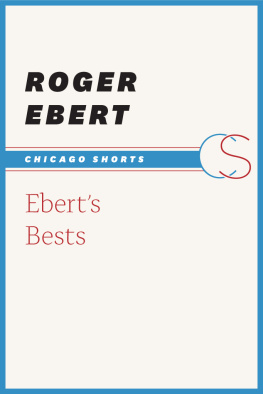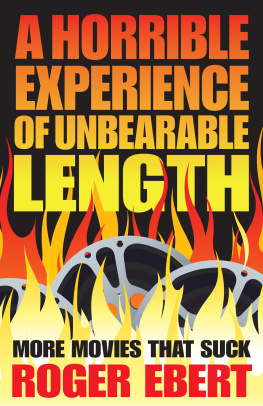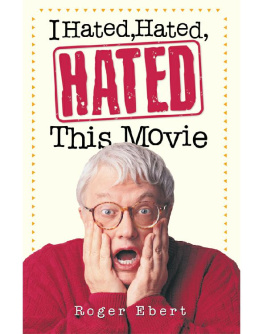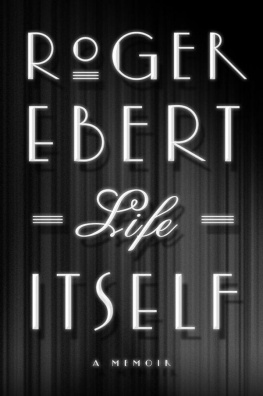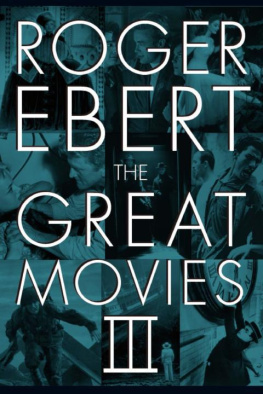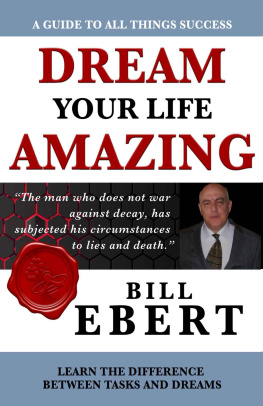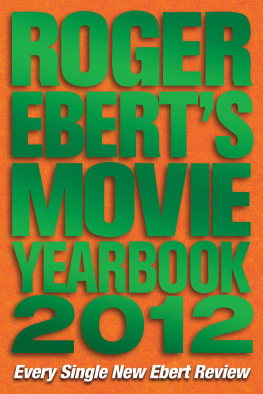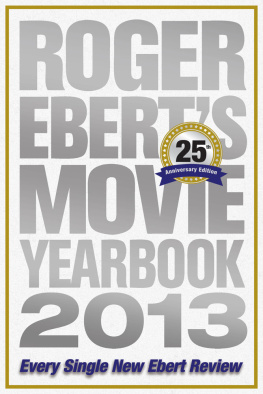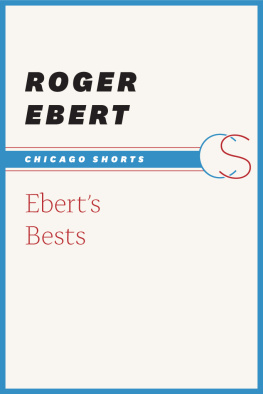Ebert - Eberts Bests
Here you can read online Ebert - Eberts Bests full text of the book (entire story) in english for free. Download pdf and epub, get meaning, cover and reviews about this ebook. year: 2013, publisher: The University of Chicago Press, genre: Non-fiction. Description of the work, (preface) as well as reviews are available. Best literature library LitArk.com created for fans of good reading and offers a wide selection of genres:
Romance novel
Science fiction
Adventure
Detective
Science
History
Home and family
Prose
Art
Politics
Computer
Non-fiction
Religion
Business
Children
Humor
Choose a favorite category and find really read worthwhile books. Enjoy immersion in the world of imagination, feel the emotions of the characters or learn something new for yourself, make an fascinating discovery.
- Book:Eberts Bests
- Author:
- Publisher:The University of Chicago Press
- Genre:
- Year:2013
- Rating:4 / 5
- Favourites:Add to favourites
- Your mark:
- 80
- 1
- 2
- 3
- 4
- 5
Eberts Bests: summary, description and annotation
We offer to read an annotation, description, summary or preface (depends on what the author of the book "Eberts Bests" wrote himself). If you haven't found the necessary information about the book — write in the comments, we will try to find it.
Eberts Bests — read online for free the complete book (whole text) full work
Below is the text of the book, divided by pages. System saving the place of the last page read, allows you to conveniently read the book "Eberts Bests" online for free, without having to search again every time where you left off. Put a bookmark, and you can go to the page where you finished reading at any time.
Font size:
Interval:
Bookmark:
Eberts Bests Roger Ebert Chicago Shorts Eberts Bests comes from a selection from Awake in the Dark by Roger Ebert and from rogerebert.com, 2006 by The Ebert Company, Ltd., and 2012 by rogerebert.com All rights reserved. Chicago Shorts edition, 2013 ISBN: 978-0-226-04890-1 CONTENTS Becoming a Film Critic I began my work as a film critic in 1967. I had not thought to be a film critic, and indeed had few firm career plans apart from vague notions that I might someday be a political columnist or a professor of English. I came up to Chicago in September 1966 as a PhD candidate at the University of Chicago, which was kind enough to accept me although I did not have my MA from the University of Illinois; I had fulfilled all of the requirements except the foreign language, which they assured me I could take care of during the first year. It was not that I could not learn French, but that I would not: I resisted memorizing and repeating, and there was something stubborn and unyielding in my refusal that had its origins, I suspect, in the tear-stained multiplication tables over which I was drilled in grade school. To read, to listen, to watch, and to learn came easily to me, but to memorize was a loathsome enterprise.
I never did get a decent grade in French. I had done some freelance book reviewing for the Chicago Daily News, and applied for a job there. Herman Kogan, the arts editor, forwarded my letter to James Hoge, city editor of the Chicago Sun-Times, who took me out to lunch with Ken Towers, his assistant. After a chicken sandwich at Riccardos I was hired as a feature writer on the papers Sunday supplement. Today students are on a career path beginning almost in grade school, but I must truthfully say my only object in attending college was to take literature classes because they were fun. I read books and talked and wrote about them, and got grades that let me continue to do that; I would have happily remained an undergraduate forever.
To be hired by the Sun-Times after applying to the Daily News was the first of several accidents, or strokes of good luck, that would form my future; when young people ask for career advice, I tell them there is no such thing, only the autobiography of the person they are asking, whose career was likely fashioned as much by chance as design. Chicago in 1966 was caught up in the era of the war in Vietnam, the Beatles, hippies, flower power, psychedelic art, and always the movies. Philip Larkin assures us, Sexual intercourse began In nineteen sixty-three (which was rather late for me) Between the end of the Chatterley ban And the Beatles first l.p. And the movies began for my generation at about the same time or a little earlier. The two were not unrelated. The great turning point was the French New Wave.
In Champaign-Urbana I haunted the Art Theater, watching the films of Franois Truffaut, Jean-Luc Godard, Ingmar Bergman, Federico Fellini, the Angry Young Men and the spontaneities of John Cassavetes. Some of my curiosity was driven by sexual desire; I saw in foreign films what Hollywood never dealt with. What I also saw was a world far outside my own. In the movies as well as in the books I was reading (the Beats as much as the Russians and the Victorians) was a range of life that filled me with uneasy hungers. I wanted to go to California. I wanted to go to England, to France.
I wanted to go somewhere. In 1962 I bought a $325 charter flight to Europe and saw La Dolce Vita again in a theater on Piccadilly Circus and The Third Man on a rainy day in a smoky revival house on the Left Bank of Paris. In high school I had seen a re-release of Citizen Kane at the Art Theater, and by the act of watching it I learned that films were made by directors and had a style. Before then I thought they were about stars and told a story. On campus at the film societies, I saw Akira Kurosawa and Sergei Eisenstein, and was no less awed by Fred Astaire and Ginger Rogers, the Marx Brothers, Humphrey Bogart, Robert Mitchum, and Billy Wilder. The Daily Illini had a film critic, a graduate student named Ron Szoke.
I became editor of the paper in my senior year at the University of Illinois and had endless conversations with him, during which I felt that I had a very great deal to learn about film. After the Sunday night screenings of international films at the Auditorium, we would all stream down the quadrangle to the basement of the Illini Union, where a professor named Gunther Marx would fascinate us with his readings of Luchino Visconti, Vittorio De Sica, Michelangelo Antonioni, and Alain Resnais. Last Year at Marienbad, he explained, was a working out of the theories of Claude Levi-Strauss. I did not know a thing about Claude Levi-Strauss, but was fascinated by this information, and repeated it wisely for years, all about the Lover, the Loved One, and the Authority Figure. Gunther Marxs son would grow up to be Frederick Marx, one of the makers of Hoop Dreams. What I knew about film criticism, I knew from Ron Szoke and from the monthly columns of Dwight Macdonald in Esquire. He wrote about the movies in a way I had not experienced before, informally, angrily, with digressions and asides and the notion that sometimes they were saying something other than what they seemed to be saying. There were no film classes at Illinois in those years.
The Campus Film Society was run by Daniel Curley, a novelist, short story writer, and professor of English, whom I adopted as my mentor, signing up for every class he taught, even the writing workshop at which Larry Woiwode read his work and the rest of us simply sat there and stared at him in envy. Curley loved the movies in a personal way, and a word from him sent me to any film he mentioned. In 1965 I was returning through London after a year at the University of Cape Town, and he was there with his family on a sabbatical. We went to the Academy Cinema to see Shakespeare Wallah, and took the walk that later became our book The Perfect London Walk. In my new job at the Sun-Times I wrote about bottled water, hero priests, snake charmers, fortune tellers, and the filming of Camelot. That was my first visit to a movie location. Josh Logan spent most of a day trying to make a lake on the back lot at Warner Brothers look green. On Monday nights, when Second City was dark, they showed underground films in the theater, and I reviewed them for the paper.
I wrote obituaries of Walt Disney and Jayne Mansfield, and a memory of the childrens matinees of my youth, when the coming of spring was announced by the arrival at the Princess Theater of Dan-Dan the Yo-Yo Man, an official representative of the Duncan Yo-Yo Company. He held a yo-yo contest on the theater stage. Winner got the Schwinn. Robert Zonka, who was named the papers feature editor the same day I was hired, became one of the best friends of a lifetime. One day in March 1967 he called me into a conference room, told me that Eleanor Keen, the papers movie critic, was retiring, and that I was the new critic. I walked away in elation and disbelief, yet hardly suspected that this day would set the course for the rest of my life.
How long could you be a movie critic, anyway? I had copies of Pauline Kaels I Lost It at the Movies, Arthur Knights The Liveliest Art, and Andrew Sarriss Interviews with Film Directors, and I read them cover to cover and plunged into the business of reviewing movies. In my very first review I was already jaded, observing of Galia, an obscure French film, that it opens and closes with arty shots of the ocean, mother of us all, but in between its pretty clear that what is washing ashore is the French New Wave. My pose in those days was one of superiority to the movies, although just when I had the exact angle of condescension calculated, a movie would open that disarmed my defenses and left me ecstatic and joyful. Two movies in those first years were crucial to me:
Next pageFont size:
Interval:
Bookmark:
Similar books «Eberts Bests»
Look at similar books to Eberts Bests. We have selected literature similar in name and meaning in the hope of providing readers with more options to find new, interesting, not yet read works.
Discussion, reviews of the book Eberts Bests and just readers' own opinions. Leave your comments, write what you think about the work, its meaning or the main characters. Specify what exactly you liked and what you didn't like, and why you think so.

